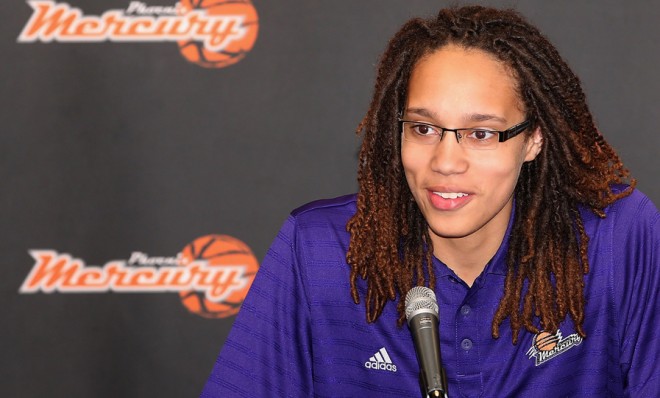Why is Jason Collins coming out a bigger deal than Brittney Griner?
Some critics blame sexism

A free daily email with the biggest news stories of the day – and the best features from TheWeek.com
You are now subscribed
Your newsletter sign-up was successful
With the nation's attention fixated for much of the last week on Jason Collins becoming the first active male athlete in a major team sport to come out as gay, you might be forgiven for forgetting — if you ever knew — that the number one WNBA draft pick, Brittney Griner, came out a few weeks ago. Or that Sheryl Swoopes did in 2005. Or that Martina Navratilova and Billie Jean King did in the 1980s (the latter was outed).
How do we explain the difference in media fanfare between Griner's announcement and Collins'? Why is Collins heralded over and over as a Jackie Robinson–type figure, while Griner gets a shrug from much of the press?
As many commentators have noted, one obvious difference between Collins and Griner is that one is a man, and one is a woman. Billie Jean King, for one, blames sexism for the vastly differing levels of press coverage:
The Week
Escape your echo chamber. Get the facts behind the news, plus analysis from multiple perspectives.

Sign up for The Week's Free Newsletters
From our morning news briefing to a weekly Good News Newsletter, get the best of The Week delivered directly to your inbox.
From our morning news briefing to a weekly Good News Newsletter, get the best of The Week delivered directly to your inbox.
Brittney Griner came out and nobody even talked about it. I don't think I even heard anything. Because we are girls we don't get the attention. Annika Sorenstam played in a PGA tournament and the reason she got so much attention is she was playing with the men. When you are in a men's arena you get attention, and that is all you have to remember. [Via New York]
Another part of this, says Henry Abbott at ESPN, is that "heterosexual men have long acted scared of gay men, and particularly of being sexually assaulted by them." And as we all know, "fear and hatred have always walked hand in hand." In that sense, Collins had to overcome a tougher — or at least a different — kind of hurdle than Griner faced, which helps explain the differing media coverage.
Of course, not everyone is buying that this heterosexual male fear of and discomfort with homosexuality explains the differing receptions for Griner and Collins. At New York, Ann Friedman chalks up the disparity in attention to the disconnect in the way we view gay men and lesbians — and male and female athletes. "We almost expect women athletes not to be classically beautiful or feminine, and therefore we're not surprised to learn they're gay," writes Friedman. On the other hand, "male professional athletes are thought to be our most masculine specimens. So when they come out as gay, it seems they're playing against type." In this view, Griner's story wasn't a shock because all along there was a "perceived lack of femininity." Griner is 6' 8" and is so good that one opposing coach actually said "I think she's one of a kind. I think she's like a guy playing with women." Collins, though, meets all of our machismo expectations, so when he comes out as gay, "we sit up and take notice."
Sadly, Friedman continues, our notions of sexuality and gender roles are still deeply linked." And even though Collins has taken a big step, "it'll take more than a gay NBA player — or, say, a lesbian Miss America or prima ballerina — for us to fully learn this lesson." But at least this is the start of the "long process of decoupling heterosexuality and masculinity." One day, maybe we'll get to the same place with "women and notions of feminity, too."
A free daily email with the biggest news stories of the day – and the best features from TheWeek.com
Emily Shire is chief researcher for The Week magazine. She has written about pop culture, religion, and women and gender issues at publications including Slate, The Forward, and Jewcy.
-
 The ‘ravenous’ demand for Cornish minerals
The ‘ravenous’ demand for Cornish mineralsUnder the Radar Growing need for critical minerals to power tech has intensified ‘appetite’ for lithium, which could be a ‘huge boon’ for local economy
-
 Why are election experts taking Trump’s midterm threats seriously?
Why are election experts taking Trump’s midterm threats seriously?IN THE SPOTLIGHT As the president muses about polling place deployments and a centralized electoral system aimed at one-party control, lawmakers are taking this administration at its word
-
 ‘Restaurateurs have become millionaires’
‘Restaurateurs have become millionaires’Instant Opinion Opinion, comment and editorials of the day